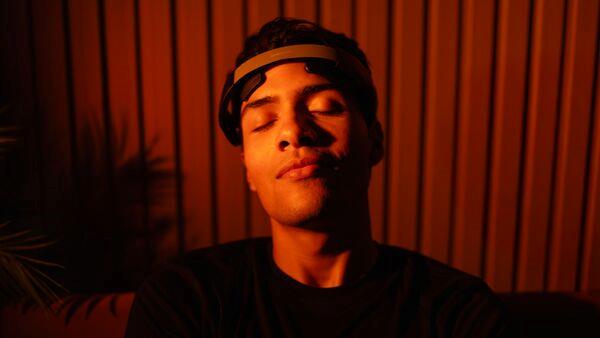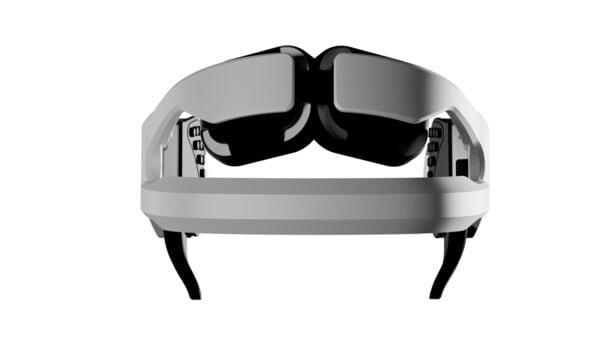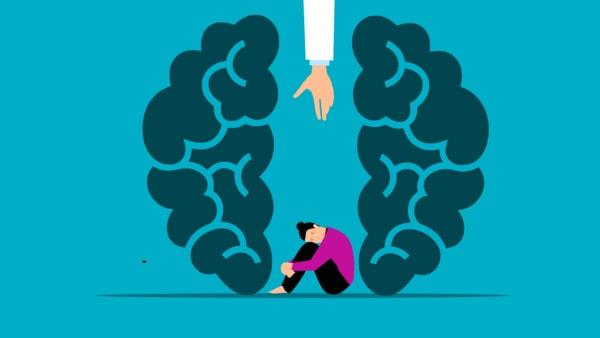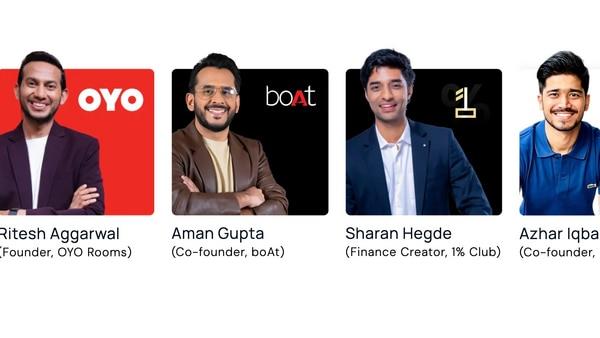
The Headset That 'Talks To Your Brain': Can India's New Wearables Cure Anxiety And Depression?
It's a quiet Tuesday evening inside the Blue Tokai Coffee Roasters cafe in Koramangala, Bengaluru. The aroma of freshly brewed coffee hangs in the air as I'm handed a device that looks fairly simple, black in colour and something between a headband and a headset, except it doesn't cover the ears. There are no flashy screens, no blinking lights, no music to play. It isn't built to count your steps or track your sleep. Instead, it goes a step ahead and is aimed at speaking to your brain.
“This might feel like a slight tingling," says Jai Sharma, co-founder of Mave Health, a Bengaluru-based mental wellness startup, as he connects the headset to an app on his phone. He taps a button on his phone. A few seconds later, I feel it, a faint, rhythmic pulse against my forehead, subtle enough to ignore but impossible not to notice. It's called neurostimulation, and it promises to do what few wearables have dared to attempt: calm the mind, ease stress, sharpen focus and, in some cases, assist in treating conditions such as depression, anxiety, Attention Deficit Hyperactivity Disorder (ADHD), Obsessive–Compulsive Disorder (OCD) or addiction.
For years, India's wellness tech has revolved around metrics and tracking: how fast you ran, how well you slept, how many calories you burned. But startups such as Mave Health, Marbles Health, InnerGize, UK-based Mindspire and Israel-based BrainQ are rewriting that script. They are building devices that don't just measure mental wellbeing, but aim to improve it.
Their approach combines neuroscience, design and accessibility with the ambition to bring brain-tech out of laboratories and into everyday life. These startups are running pilots, seeking regulatory clearances and raising early rounds of capital to make neurostimulation both affordable and mainstream.
To be sure, these devices and their underlying technology are at an early stage, with limited data or evidence as to their efficacy. Medical professionals made it clear to Mint that even if they do what they claim to do, they are not a silver bullet for mental illness and certainly not a primary health treatment. They emphasized that these wearables can at best work as an adjunct, or when traditional methods such as drugs and other treatments have failed, and decided by a doctor on a case by case basis.
The core techMental health in India and globally, to a large extent, has traditionally been treated with antidepressants or therapy, based on assessments by psychologists or psychiatrists through clinical evaluations and questionnaires. For more severe cases, treatments may extend to neuromodulation techniques such as transcranial magnetic stimulation (TMS), electroconvulsive therapy (ECT) or electric shocks, and, more recently, transcranial direct current stimulation (tDCS). These are non-invasive stimulation methods that target specific regions of the brain to alleviate symptoms of depression and other mental health disorders.

View Full Image
Mental health has traditionally been treated with antidepressants or therapy. (iStockphoto)
tDCS, used by Mave Health and Marbles Health, is a gentle brain-stimulation technology that works by sending a very small, safe electrical current through your scalp to specific areas of the brain. This current helps certain parts become a little more active or calm, depending on the need.
The tech has been around for decades, used in labs and research, but it's only in the last few years that there has been a resurgence due to advances in hardware (smaller, safer, wearable devices), better understanding of stimulation parameters, and clinical research that supports its use for mood disorders, depression, anxiety, cognition and rehabilitation, among others.
However, the technology has been largely absent in India. According to Lakshay Sahni, founder of Marbles Health, only a few big hospitals had a machine that uses this technology as it is prohibitively expensive. The traditional machine is large and complex to use.
Mave Health, founded in 2023, was born out of personal tragedy. When a close friend of the founders, who had struggled with depression despite being on therapy and antidepressants, took her own life, it forced them to confront how little they understood about mental health.“We were engineers, not people who talked about mental health," Sharma said. What began as an attempt to understand what went wrong soon turned into a deeper exploration of why existing treatments often fail to deliver results.

View Full Image
Portable devices from companies like Mave Health target specific conditions, such as anxiety or depression, by stimulating the prefrontal cortex.
Marbles Health, founded in 2020, was born out of a shared passion for neurotechnology and a personal experience with mental illness. Founders Ramya Yellapragada and Sahni met during a fellowship programme. Both had seen close family members struggle with long-term mental health issues, conditions that medication and therapy failed to alleviate. Their search for answers led them to discover neuromodulation, a clinically proven but costly technology available to only a handful of patients in India. Seeing how transformative it could be, they decided to make it widely available.
Today, Marbles Health manufactures portable, easy-to-use tDCS devices and supplies them to clinics, while Mave Health imports devices from Denmark and offers them through a subscription model to select people.
The key difference lies in form factor and accessibility.“Traditional neurostimulation machines used in hospitals are large, modular and designed to treat multiple disorders by changing electrode placements," said Mave Health's Sharma.“Portable devices like ours target specific conditions, such as anxiety or depression, by stimulating the prefrontal cortex, making them far more affordable and convenient for regular use."
Marbles Health goes a step further by collecting brainwave data, enabling medical professionals and individuals to track progress and better understand a patient's mental health, turning what was once a purely clinical procedure into a more personalized, data-driven experience.“There's no standard as to how to evaluate this brain data at the moment, but the goal is to create that standard by analysing the huge amount of data we can get from the patients using the device, with artificial intelligence," said Sahni.
Marbles Health collects brainwave data, enabling medical professionals and individuals to track progress and better understand a patient's mental health, turning what was once a purely clinical procedure into a more personalized, data-driven experience.To use the device, a user simply places it on the head and starts the stimulation through an app on a phone or tablet. Each session runs for about 20-30 minutes, and most doctors advise completing a course of roughly 5-20 sessions for noticeable results.
Other startups such as InnerGize, based out of New Delhi, are also building neurotech devices that target the vagus nerve to shift the nervous system from a“fight‐or‐flight" response to“rest‐and‐restore," which indirectly impacts the state of the brain.
Wellness or clinical?While Mave Health positions its headset as a wellness device that doesn't require medical regulation, Marbles Health's EASE takes a more clinical route. It is India's first portable neuromodulation device approved by the Central Drugs Standard Control Organisation (CDSCO), the body overseeing medical device licensing and imports, and validated by the All India Institute Of Medical Science, Delhi. It has been used in over 3,000 sessions nationwide in less than six months.

View Full Image
Marbles Health's EASE is a portable neuromodulation device approved by the Central Drugs Standard Control Organisation.
There's strong research backing tDCS technology, but the distinction lies in regulatory rigour. Clinical devices such as Marbles' EASE require medical certifications and must undergo post-market surveillance to ensure safety and efficacy. Wellness wearables, by contrast, depend largely on user feedback and testimonials rather than clinical validation.
Mave Health is focusing on stress and anxiety from a lifestyle standpoint rather than a treatment standpoint at the moment, according to Sharma. Marbles Health's EASE addresses problems ranging from stress, anxiety, to ADHD, OCD, addiction and chronic pain management.
India has concrete rules that say that all medical devices are regulated under the Medical Device Rules (MDR), 2017, enforced by the CDSCO. tDCS devices do fall under these rules, but if a company avoids making explicit medical claims (for example, 'treats depression'), and instead uses wellness-focused language ('enhances calm,' 'supports focus'), they can operate in a regulatory loophole. Much like how real money gaming companies used linguistic loopholes to avoid regulation by marketing games of chance as 'games of skill' to avoid gambling prohibitions, until they were forced to stop by an Act of Parliament.
“We are not saying that stimulation is the answer to all problems and people will get treated with 100% efficacy. We are just saying that this is one pillar, with a shorter period for effect and no side effects," explained Yellapragada of Marbles Health.“With stimulation, you can achieve the same effect in 20 sessions that medication will take two months for," she noted, adding that it doesn't have to be taken lifelong, as is sometimes the case with drugs.“You can sustain the changes using exercise, therapy or yoga."
At Mind and Brain Hospital in Bengaluru, which uses Marbles Health's device, over 1,000 sessions have been conducted in six months. Currently, users can access the device either at clinics partnered with the company or at home in Delhi through its supervised at-home service, launched recently.
At Mind and Brain Hospital in Bengaluru, which uses Marbles Health's device, over 1,000 sessions have been conducted in six months. Currently, users can access the device either at clinics partnered with the company or at home in Delhi through its supervised at-home service.Mave Health, meanwhile, works with a select cohort of about 20-25 individuals at a time, who subscribe to and use the device as part of its programme, which also includes consultation sessions with psychiatrists, weekly therapy sessions, and fitness and yoga classes.
Ultimately, these startups envision a future where such devices could be used independently, at home. Doctors, however, warn that neurostimulation is not a replacement for antidepressants or psychotherapy.“It can benefit patients with treatment-resistant depression, showing similar or better efficacy than medications in select cases, but not universally superior," said Dr Khushboo Hatekar, assistant professor of neurology at Dr D.Y. Patil Medical College, Hospital and Research Centre, Pune. She added that neurostimulation may help when conventional options fail or cause side effects.
Dr Rituparna Ghosh, senior consultant psychologist at Apollo Hospitals, Navi Mumbai, also added a note of caution:“They work best when integrated into a comprehensive treatment plan supervised by a qualified mental health professional. The key is personalization; what works for one patient may not work for another, and clinical judgment remains essential in determining the appropriate role of these technologies."
The scaleMental illness manifests in many forms, from anxiety and depression to bipolar disorder and schizophrenia, and its impact often runs deeper than symptoms alone. For many patients, the struggle is daily and relentless, whether it is in being functional, holding on to a job, dealing with other human beings or even managing simple routines.

View Full Image
In urban areas, extreme heat, flooding and pollution aggravate stress and anxiety, particularly among people living in overcrowded settings.
Moreover, the stigma around mental health still keeps people from seeking help, while access to affordable treatment remains limited, especially outside big cities. Therapy and medication are expensive, often inconsistent, and rarely covered by insurance.
As a result, countless individuals fall through the cracks, caught between social neglect and an overstretched healthcare system, a gap that turns what should be a treatable condition into a lifelong battle.
This massive treatment gap has created an opportunity for scalable tech-led interventions. According to consulting firm Redseer, around 200 million Indians need mental health care, yet only 10-15% of them are actually receiving it.
The country's mental health market was valued at about $20 billion in 2024 and is projected to reach $27 billion by 2033, according to research firm IMARC Group. Despite this growth, investors and experts say the category will remain a niche for the next few years before it moves into the mainstream.
Eyeing the opportunity, leading early-stage investors, including All In Capital, Bharat Founders Fund, Whiteboard Capital and Antler India, as well as prominent entrepreneurs such as Zomato's Deepinder Goyal, Boat's Aman Gupta and CRED's Kunal Shah, have infused a modest amount of funding into Marbles ($289,000; amount in latest round not disclosed), Mave ($720,000) and InnerGize ($760,000).

View Full Image
A screengrab from InnerGize's website showing its backers.
“Mental health neurotech is still a new concept for most Indians," said Maanav Sagar, managing partner at Bharat Founders Fund, which has invested in Mave Health.“Limited awareness, scepticism around brain stimulation, and early access barriers (since adoption is concentrated in metros) will slow down mass uptake initially."
Yet, the long-term opportunity remains significant. With nearly 900 million internet users and wearables now shipping at scale, data-driven mental health products are becoming more viable, said Kushal Bhagia, founder sn partner at All In Capital, another investor in the Bengaluru-based startup.“Policy support is strong, medical devices are regulated under MDR 2017, and a dedicated PLI (production-linked incentive) scheme is driving investment and exports. India's medtech push and import substitution trends also create a clear export opportunity for locally developed neurotech devices."
Bhagia explained the market potential with numbers: depression and anxiety affect roughly 91 million Indians. Even if only 10-15% are diagnosable and reachable digitally, and 2-4% are open to non-pharma alternatives, that's still around 3.5 million potential users.“At a device price of up to ₹25,000 and ₹3,000-6,000 in annual software revenue, the near-term serviceable market stands at about ₹11,000 crore," Bhagia said.
For most companies in the space, India is only the beginning-the ambition is global.“We want to reach one in five homes worldwide; it's never going to be just India," said Sahni of Marbles Health.“We're already in talks in the UK, and US expansion will follow soon." Mave Health is also in the process of expanding to the US.
The road aheadMave Health currently offers its device as part of a two-month holistic plan priced at around ₹40,000. Marbles Health, on the other hand, sells its devices to clinics and hospitals for about ₹2.5 lakh each. These clinics then charge end users between ₹900 and ₹2,000 per session, depending on factors such as location and population density. For these businesses to sell the device directly to customers, or scale meaningfully, however, the cost will need to come down further.
Some devices may create a false sense of treatment adequacy, preventing people from seeking professional help. - Rituparna GhoshBeyond affordability, experts warn that without robust clinical trials and regulatory oversight, unproven products could end up doing more harm than good.“Some devices may create a false sense of treatment adequacy, preventing people from seeking professional help when they genuinely need it," said Dr Ghosh. She added that the growing medicalization of normal human emotions is also concerning.“Not every period of sadness requires technological intervention-these devices may create anxiety about normal mood fluctuations."
Then there are concerns around data privacy, device accountability and safety monitoring. Consumer-facing startups often lack the resources and infrastructure for comprehensive post-market surveillance or user support, leading to uncertainty about responsibility if something goes wrong.
“Ultimately," Dr Ghosh said,“we need standardized assessment criteria and independent third-party validation systems to help clinicians and individuals distinguish genuinely useful tools from digital snake oil."
Legal Disclaimer:
MENAFN provides the
information “as is” without warranty of any kind. We do not accept
any responsibility or liability for the accuracy, content, images,
videos, licenses, completeness, legality, or reliability of the information
contained in this article. If you have any complaints or copyright
issues related to this article, kindly contact the provider above.
Most popular stories
Market Research
- Thinkmarkets Adds Synthetic Indices To Its Product Offering
- Ethereum Startup Agoralend Opens Fresh Fundraise After Oversubscribed $300,000 Round.
- KOR Closes Series B Funding To Accelerate Global Growth
- Wise Wolves Corporation Launches Unified Brand To Power The Next Era Of Cross-Border Finance
- Lombard And Story Partner To Revolutionize Creator Economy Via Bitcoin-Backed Infrastructure
- FBS AI Assistant Helps Traders Skip Market Noise And Focus On Strategy




















Comments
No comment